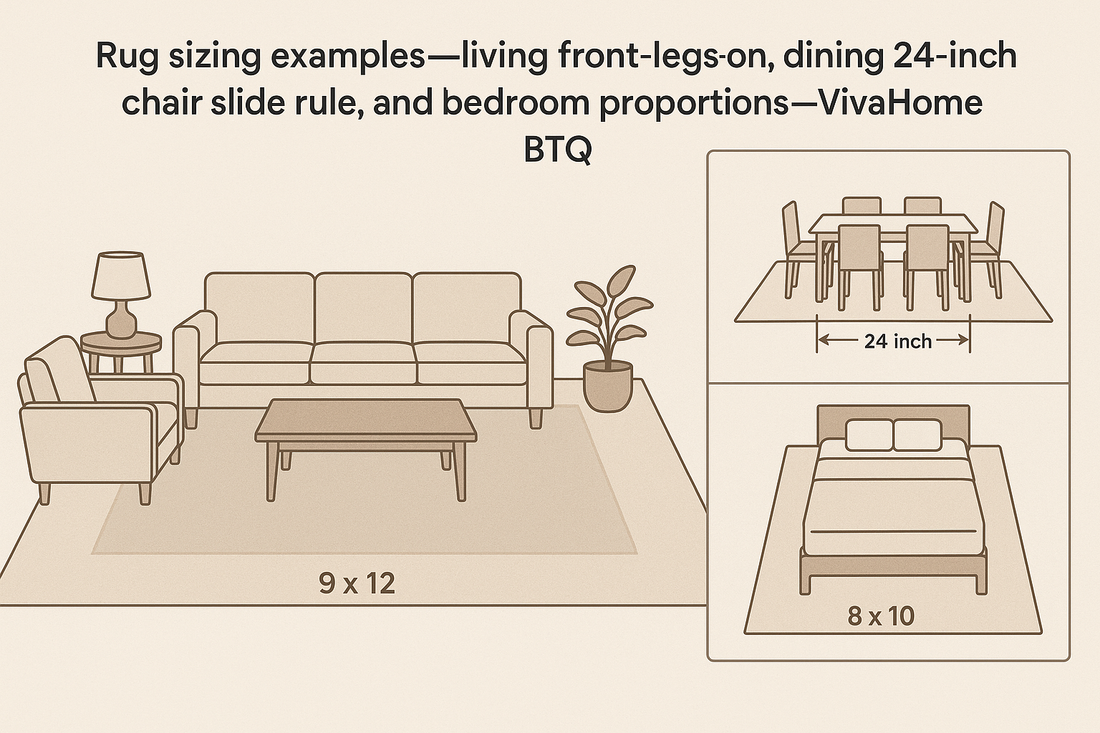
Rug Alchemy: Sizing, Placement & Materials for Living, Dining, and Bedroom | VivaHome BTQ
Share
Prologue
A rug is not a mere accessory; it is groundwork—the plane upon which the room acquires grammar and grace. Too small, and the furniture floats like lost ships. Sized and placed with intention, a rug gathers the room into a single, coherent sentence. Let us specify with dignity: numbers, rules, and quiet craft.
1) Living Room: The Three Layouts (and when to use each)
1) All-Legs-On (Grand, Cohesive)
-
Best for large rooms and open plans.
-
Target sizes: 9'×12' or 10'×14' (larger if sectional is deep).
-
Leave 8–18 in of floor reveal around the perimeter.
2) Front-Legs-On (Elegant, Flexible)
-
The sofa’s front legs and each chair’s front legs rest on the rug.
-
Typical sizes: 8'×10' or 9'×12'.
-
Align the rug’s front edge with the coffee table’s midline for balance.
3) Floating Conversation (Small, Symmetrical)
-
A large round or 7'×10' rectangle under a compact seating island.
-
Use only if circulation demands it or the space is narrow.
Measuring Ritual (copy this)
-
Tape out the ideal footprint first; measure the tape, not your hopes.
-
Furniture should sit like shoreline to the rug—touching, not teetering.
2) Dining Room: The Chair-Slide Rule
-
Rug extends 24 in (61 cm) beyond the table on all sides so chairs stay fully on the rug when pulled out.
-
Round table → round rug (or an oversize square) looks intentional.
-
Typical pairings:
-
4-person round (42–48 in) → 8' round rug
-
6-person rectangle (60–72 in) → 8'×10'
-
8-person rectangle (78–96 in) → 9'×12'
-
Practical notes
-
Low-pile or flatweave resists crumbs and chair drag.
-
Use a felt + rubber pad to stop drift on smooth floors.
3) Bedroom: Composure at First Light
Queen Bed
-
8'×10' placed under the lower two-thirds of the bed (nightstands off the rug).
-
Alternative: Two runner rugs (2'6"×8') on either side + a bench mat at the foot.
King Bed
-
9'×12' for dignified side coverage.
-
If room is deep, push to 10'×14' and widen the nightstand reveal.
Small Rooms
-
Choose a 6'×9' under the lower half of a queen; extend at least 18–24 in past each side where feet land.
4) Materials & Pile: Choose for Use, Not for fantasy
-
Wool: resilient, naturally soil-resistant, ages beautifully; ideal for living and bedrooms.
-
Wool-Blend / Performance Fibers (PET/PP): family-proof, easy clean; dining, entries, kid spaces.
-
Jute/Sisal/Seagrass: textural and grounded; pair with a cushiony pad (not ideal under dining chairs unless tightly woven).
-
Viscose/Rayon/Silk: luminous but tender; reserve for low-traffic rooms.
-
Flatweave vs Pile: flatweaves read architectural; medium pile adds hush and softness.
5) Color & Pattern: Architect the Mood
-
Quiet Neutrals (oat, stone, mushroom): raise perceived ceiling height; let artwork speak.
-
Deep Grounds (indigo, charcoal, forest): anchor airy rooms and pale upholstery.
-
Pattern Strategy: large-scale pattern = modern calm; small, intricate pattern = forgiving of life’s crumbs.
-
One Echo Rule: repeat a rug hue once elsewhere (a pillow, a vase), never everywhere.
6) Pads, Edges & Safety (the unsung heroes)
-
Always add a pad: felt-rubber for hard floors, grip mesh for rugs over carpet.
-
Serge or bind exposed edges on custom cuts; crisp edges keep rugs looking tailored.
-
Clear door swings with ¼–⅜ in pile at thresholds.
7) Care & Cleaning Cadence
-
Weekly: vacuum with beater bar off for wool/flatweaves; on low for performance piles.
-
Quarterly: rotate 180° to even sun and traffic.
-
Spill protocol: blot (don’t rub), lift solids, treat per fiber; test cleaner in a hidden corner.
-
Annual: professional clean for wool; spot-clean synthetics as needed.
8) Common Mistakes (and the gracious fix)
-
Rug too small: scale up one size; the room will exhale.
-
Islanded coffee table: slide sofa onto the rug 6–8 in; instant cohesion.
-
Dining chairs catching: you’ve missed the 24-in rule—size up or reduce table leaf.
-
Pattern chaos: if the sofa, curtains, and rug all shout, let two whisper.
9) Small-Space Tactics
-
Use one large rug to visually merge zones in a studio; avoid patchwork.
-
In long rooms, a pair of runners can create a gracious runway to the seating group.
-
Mirror a hall runner with a narrow console and a single artwork; elegance loves restraint.
10) Room-by-Room Starter Sets | VivaHome BTQ
-
Living: 9'×12' wool or performance weave + felt-rubber pad + neutral throw pillows to echo a rug accent.
-
Dining: low-pile 8'×10' or 9'×12' + wipeable placemats + chair glides.
-
Bedroom: 8'×10' (queen) or 9'×12' (king) + linen duvet in a tone pulled from the rug.
FAQ
Q: Should the coffee table be centered on the rug or the sofa?
A: Center to the seating group, not the room shell. If the sectional is asymmetrical, align to the longest seating edge.*
Q: Can I layer rugs?
A: Yes—large neutral base + smaller patterned accent. Keep pile heights compatible to avoid toe-catches.*
Q: I love jute but have dining chairs with thin legs.
A: Choose a tight weave or move jute to living/bed; under dining, a smooth low-pile is kinder to chair feet.*
Q: Pets & spills?
A: Performance fibers or wool with pattern; commit to pads, rotation, and immediate blotting.*
Epilogue / CTA
Compose the ground first, and the room will compose itself. Explore VivaHome BTQ for wool and performance rugs, pads, runners, and low-pile dining options—then measure with conviction and place with calm.
